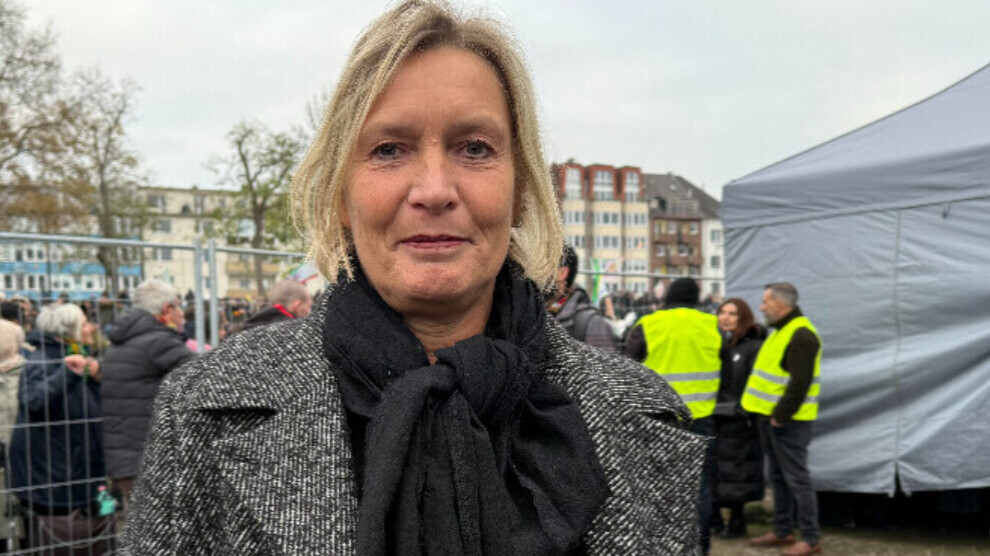Geisweid: German government must support the peace process
Heike Geisweid stated that Germany has a responsibility to support peace and emphasized the need to lift the PKK ban to enable democratic dialogue.
Heike Geisweid stated that Germany has a responsibility to support peace and emphasized the need to lift the PKK ban to enable democratic dialogue.

Despite the Kurdistan Workers’ Party (PKK) announcing at its 12th Congress that it would end all its activities and dissolve itself, the continuation of the PKK ban in Germany since 1993 raises a number of questions.
Last week, an application was submitted to the Berlin Administrative Court for the lifting of the PKK ban in Germany. In an interview with ANF about the case, Heike Geisweid, chair of the Association for International Law and Democracy (MAF-DAD) and a lawyer, said: "The ball is now in the court of German decision-makers,” emphasizing that the German government must take responsibility on this issue.
Heike Geisweid stated that the application called for the lifting of the PKK ban, its reconsideration, and the annulment of the related regulation. She emphasized that the German left must also take an active role in this process.
How do you interpret the PKK’s decision to “end activities under the name PKK” in its 12th Congress within the context of the PKK ban in Germany?
This is certainly a historic development for Germany. It’s not the first initiative after all these years, but in my view, it is truly a historic attempt to find a peaceful solution. We believe the German government also has a responsibility. What happens in Turkey inevitably affects Germany.
We have the largest Kurdish diaspora in the world, and there has always been a dynamic interaction. So, whenever repression against the Kurdish population in Turkey intensifies, it also has negative repercussions here. Now, following the PKK’s recent step, the German government has a duty to support the peace process.
Yet the ban on the PKK remains in place in Germany. A legal application has been filed to end it. What steps should the German government take?
In my opinion, there are two decisions that need to be made by the Federal Ministry of Justice and the Federal Ministry of the Interior. The first is the revocation of the authorization to prosecute under Article 129b, which classifies the PKK as a “foreign terrorist organization,” under which many Kurdish politicians in Germany have been convicted of PKK membership. The second is to end the prosecution of Kurdish politicians who have done nothing beyond political work in Germany yet have also been sentenced under Article 129b.
Three years ago, the PKK submitted an application for the prohibition order to be lifted, reviewed, or revoked. At that time, we also emphasized that the current situation is entirely different from what it was in 1993.
The PKK is a completely different organization from what it was in 1993
Secondly, the authorization for prosecution under Article 129b, used to convict Kurdish politicians in Germany for alleged PKK membership as a “foreign terrorist organization”, must be revoked. The PKK today is a completely different organization from what it was in 1993. The evidence used at the time no longer applies, there are no criminal offenses of the kind once cited.
Now, the PKK is saying, “We are disbanding, we are laying down arms to achieve peace in Turkey.” This is an entirely different reality. And this reality in no way justifies the continuation of the existing prohibition order, which hangs over the heads of 1.5 million Kurds in Germany like the sword of Damocles, ignoring the entire Kurdish community and enabling constant political and legal pressure.
As you mentioned, 1.5 million Kurds are affected by the PKK ban in Germany. What can the Kurdish community do to push for its removal?
There is currently an ongoing application. The application has been submitted, and naturally, it can be filed by individuals directly impacted by the ban. Although the Ministry of the Interior rejected it, the case is now before the Administrative Court and will continue to be examined there.
In principle, legal steps have been taken. The Kurdish population continues to suffer, and I believe the time has come for the German left to get involved in this process. We need support; we need to accompany the peace process. I believe the German government has a responsibility to support peace efforts. The ball is no longer in the court of the Kurdish population, it is now in the hands of those with the power to decide.